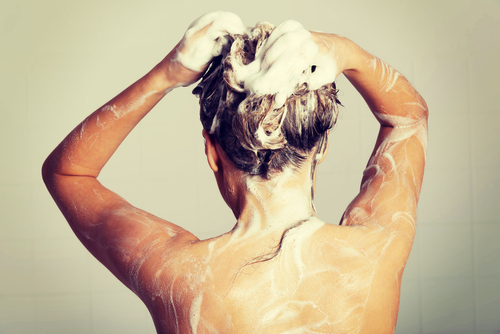Short answer
For the most part, shampoo is not bad for you. However, excessive use of shampoo is not recommended, especially for those with certain hair types or allergies.
A fairly even ratio of beneficial and harmful qualities. Moderation is important. Very general topics that can lean towards both sides of the spectrum will be placed here as well. Rice, for example, can be good or bad depending on the type.
View Full Grading System
Category 'A'
Very healthy and numerous health benefits. Side effects are rare. Things rated an 'A+' are typically necessary for survival (for example, water).
Very healthy and numerous health benefits. A few harmful qualities may be associated, but only under certain circumstances such as an allergic reaction.
Very healthy and numerous health benefits. Harmful qualities may be associated, but aren't usually serious.
It is important to note that even the best things in life can become bad in immoderate amounts. So, although something may be rated an 'A+', overconsumption/overdoing can bring unwanted effects.
Category 'B'
Very beneficial to your health. Things rated a 'B+' may have a few harmful qualities to pay attention to.
Overall beneficial to your health. Things rated a 'B' may have some harmful qualities to pay attention to.
More beneficial to your health than not. However, harmful qualities are most likely associated and shouldn't be overlooked.
The main difference between category 'A' and category 'B' is the harmful qualities typically present in 'B' items. Serious side effects are usually uncommon, but are still possible and should be taken note of.
Category 'C'
Both beneficial and harmful qualities associated. Things rated a 'C+' are typically a bit more on the beneficial side. Still, moderation is important.
A fairly even ratio of beneficial and harmful qualities. Moderation is important. Very general topics that can lean towards both sides of the spectrum will be placed here as well. Rice, for example, can be good or bad depending on the type.
More harmful than beneficial. Side effects are common, especially when consumed/done excessively. Moderation is very important.
Category 'C' usually denotes to both good and bad qualities. When it comes to this category, it is important to keep this word in mind: moderation.
Category 'D'
Harmful to your health. Although benefits may be associated, the bad most likely outweighs the good. Moderation is very important.
Harmful to your health. A few benefits may be associated, but the bad outweighs the good. Moderation is extremely important.
Harmful to your health. Very few, if any, benefits are present. Things in this category should be avoided as much as possible.
Category 'D' is typically for things that are more harmful than beneficial. While consuming/doing something unhealthy once in a blue moon shouldn't hurt, we definitely recommend eliminating 'D' items as a regular part of your routine/diet.
Category 'F'
Category 'F' is for things that fail to bring anything beneficial to the table, and are very harmful to your health. We recommend completely avoiding anything in this category. Long-term side effects of 'F' items are usually very serious.
Category 'N'
'N' stands for neutral. Things placed into this category are generally (a) neither good nor bad for you, or (b) lack the necessary evidence to reach any conclusions.
Long answer
Shampoo is a liquid that contains sodium laurel sulfates that strip hair of the sebum, or oils, in order to maintain clean and manageable hair. Most commercial shampoos mix sodium laurel sulfates with a water-soluble co-surfactant to assist in cleaning. There are many specialty shampoos available that include botanical extracts or plant derived products. There are also specialty shampoos for children and babies that are less harsh than regular shampoo, however, they still contain surfactants, including sodium laurel sulfate.
Sodium laurel sulfate can cause irritation to the skin and eyes. The greater the concentration of Sodium laurel sulfate (SLS) the more irritation it can cause. Allergies to various ingredients in shampoo are common.
There are specialty shampoos that contain organic ingredients to minimize the allergic reaction or irritation caused by chemical ingredients. The “no poo” option, made out of general household items, is increasing in popularity due to its environmental friendliness.
The people that oppose shampoo use baking soda and vinegar, diluted honey or nothing at all. Daily shampooing strips the oils produced by the scalp. The scalp then produces more oil at an increased rate, making hair greasy over time. Many experts say that unless you have fine naturally oily hair or exercise daily—you should avoid washing your hair every day, for maximum hair health. Frequent washing does not pose a risk to the body, it can just make some hair types less vibrant.
Dry shampoo is also an alternative to regular daily shampooing. It can extend the time between shampoos. Dry shampoos soak up the excess oil in hair without needing to rinse out the hair after application. They come in aerosols, liquids, and powders that can be sprinkled on the roots of hair. The powder or liquid formations are higher in quality and do not contain the unpleasant fumes that aerosol products contain. You can also make your own dry shampoo using cornstarch and essential oils.
Possible short-term side effects
- scalp irritation / dryness
-
increased oil production
-
allergic reaction
Ingredients to be aware of
Benefits
Healthier alternatives
- homemade shampoo
-
organic shampoos without sulfates
Please turn your Ad Blocker off to see this content. Thank you!
Thank you for your feedback!
Written by DeeAnne Oldham
Published on: 04-29-2016
Last updated: 12-10-2016
Thank you for your feedback!
Written by DeeAnne Oldham
Published on: 04-29-2016
Last updated: 12-10-2016

 Approved by
Approved by 






.png)






.png)

